
 GENERAL AUDIENCE TODAY
GENERAL AUDIENCE TODAY
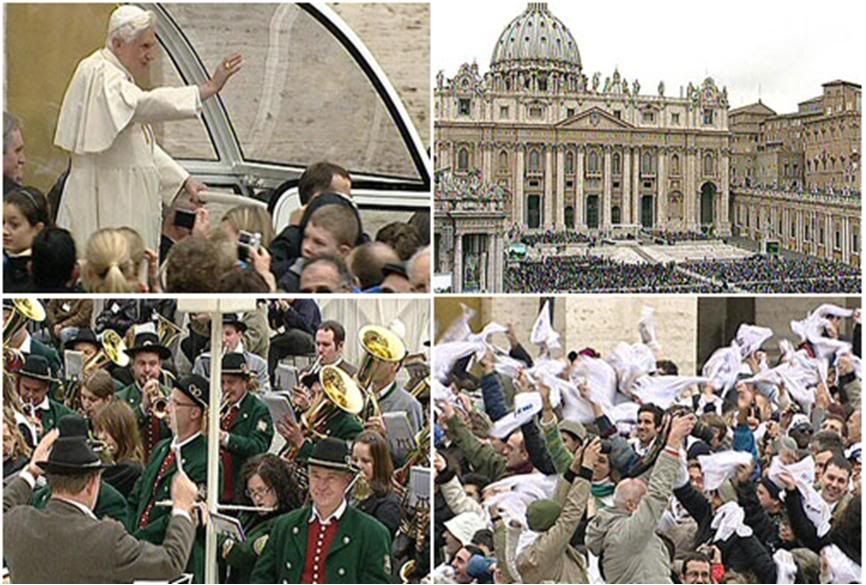
Continuing with his catechesis on the development of theology in the High Middle Ages, Pope Benedict XVI devoted his discourse at the General Audience today to a comparison between 'theology of heart' and 'theology of reason', as exemplified by Bernard of Clairvaux and Abelard of Paris.
Here is how the Holy Father synthesized it in English:
Today we continue our comparison of the monastic and scholastic approaches to theology which we began last week, by looking again at Saint Bernard of Clairvaux, this time in comparison with Abelard.
Both of them considered theology as "faith seeking understanding"; but whereas Bernard placed the accent on "faith", Abelard emphasized "understanding".
Bernard, for whom the aim of theology was to have a living experience of God, cautioned against intellectual pride which makes us think we can grasp fully the mysteries of faith.
Abelard, who strove to apply the insights of philosophy to theology, saw in other religions the seeds of an openness to Christ.
The respective approaches of Bernard and Abelard — one a "theology of the heart" and the other a "theology of reason" — were not without tension. They therefore illustrate the importance of healthy theological discussion and humble obedience to ecclesial authority.
Theology must respect the principles it receives from revelation as it uses philosophy to interpret them. Whenever a theological dispute arises, everyone, and in a particular way the Magisterium, has a responsibility to safeguard the integrity of the faith.
As we strive to deepen our understanding of the Gospel, may God strengthen us to extol its truth in charity.
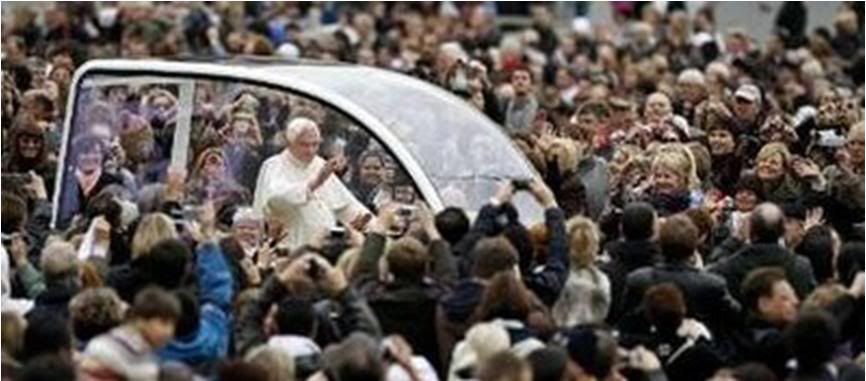
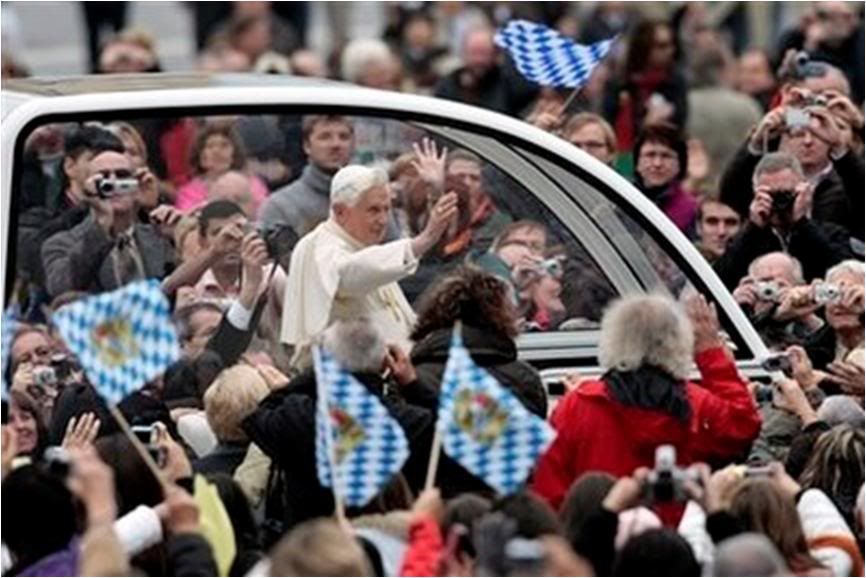 Here is a translation of the Holy Father's full catechesis:
Here is a translation of the Holy Father's full catechesis:
BERNARD AND ABELARD:
Theology of the heart
vs theology of reason
In the last catechesis, I presented the principal characteristics of monastic theology and scholastic theology in the 12th century, which we could call, in a certain sense, 'theology of the heart' and 'theology of reason', respectively.
There arose an ample and sometimes heated debate between the representsatives of one and the other theological current, symbolically represented by the controversy between St. Bernard of Clairvaux and Abelard.
To understand this confrontation between the two great teachers, it will help to remember that theology is the search for a rational comprehension, to the extent is is possible, of the mysteries of Christian revelation, believed through faith: Fides quaerens intellectum – faith seeks intelligibility - to use a traditional
definition that is concise and effective.
Now, while St. Bernard, typical representative of monastic theology, stressed the first part of the definition, namely fides, faith, Abelard, who was a scholastic, insisted on the second part, namely, on intellectus, understanding through reason.
For Bernard, faith itself is endowed with an intimate certainty, based on the testimony of Scripture and the teachings of the Fathers of the Church. Moreover, faith is reinforced by the testimony of the saints and by the inspiration of the Holy Spirit into the soul of individual believers.
In case of doubts and ambiguity, faith is protected and illuminated by the exercise of ecclesial Magisterium. Thus, Bernard found it difficult to agree with Abelard, and more generally, with those who would subject the truths of the faith to the critical examination of reason.
In his view, such an examination carried a grave danger, namely, intellectualism, the relativization of truth, placing the very truth of the faith under discussion. Bernard saw in such a procedure a daring drive which could lead to unscrupulousness, fruit of the arrogance of human intelligence that would claim to 'capture' the msytery of God.
In one of his letters, he wrote sorrowfully: "Human ingenuity is making itself the master of everything, leaving nothing to faith. It confronts that which is above it, it scrutinizes that which is superior, and that which it finds itself unable to follow, it considers null, and refuses to believe it" (Epistola CLXXXVIII,1: PL 182, I, 353).
For Bernard, theology had only one purpose: to promote the living intimate experience of God. Theology thus helps to love God ever more and even better, as expressed in the title of his tract on the duty to love God (De diligendo Deo).
Along this way, there are several steps, which Bernard describes in depth, culminating when the soul of the believer finds itself inebriated on the peaks of love. The human soul can reach this mystical union with the divine Word while still on earth, a union that the Dottor Mellifluus describes as 'spiritual wedding'.
The divine Word visits the soul, eliminates its last resistances, illumines, inflames and transforms it. In such a mystical union, the soul experiences a great serenity and tenderness, and sings to her Spouse a hymn of joy.
As I recalled in the catechesis dedicated to the life and doctrine of St. Bernard, theology for him could only nourish itself in contemplative prayer - in other words, by the affective union of heart and mind with God.
Abelard - who, among other things, had introduced the term 'theology' in the sense that we understand it today - had a different perspective. Born in Brittany, in France, this famous 12th century teacher was gifted with a lively intelligence, and his vocation was study.
He occupied himself with philosophy first, and then applied the results he acquired from that discipline to theology, which he taught in the must cultured city of his time, Paris, and subsequently, in the monasteries where he lived.
He was a brilliant orator: his classes were followed by crowds of students. A religious spirit but an unsettled personality, his life was rich with dramatic episodes: he questioned his own teachers, and he had a son by Heloise, a cultured and intelligent woman.
He often engaged in polemics with his fellow theologians, and even underwent ecclesiastical condemnation, alghough he died in full communion with the Church, to whose authority he submitted himself in the spirit of faith.
St. Bernard himself contributed to the condemnation of some doctrines of Abelard in the provincial Synod of Sens in 1140, in which he even sought the intervention of Pope Innocent II. The abbot of Clairvaux questioned, as we recalled, Abelard's too intellectualistic method which, in his eyes, reduced the faith to a simple opinion detached from revealed Truth.
Bernard's fears were not unfounded and were in fact shared by other great thinkers of the time. In effect, excessive use of philosophy rendered Abelard's doctrine of the Trinity dangerously fragile, and thus, too, his idea of God.
In the moral field, his teaching was not devoid of ambiguity: He insisted on considering the intention of the subject as the only basis for describing goodness or evil in moral acts, thus ignoring the objective significance and moral value of actions - a dangerous subjectivism.
This, as we know, is an aspect that is very actual in our time, in which culture often seems to be marked by a growing tendency to ethical relativism: only my ego decides what is good for me, at any time.
Nonetheless, we must not forget the great merits of Abelard, who had many disciples and definitely contributed to the development of scholastic theology that was destined to express itself in a more mature and fecund manner in the next century.
Nor must we undervalue some of his intuitions as, for example, when he stated that in the non-Christian religious traditions, there already is a preparation to welcome Christ, the divine Word.
What then can we today learn from the confrontation - often in heated tones - between Bernard and Abelard, and in general, between monastic theology and scholastic theology?
Above all, I think that it shows the usefulness and the need for a healthy theological discussion within the Church, especially when the
questions to be discussed have not been defined in the Magisterium, which nonetheless, remains an unavoidable reference point.
St. Bernard - and even Abelard himself - always unhesitatingly recognized the authority of the Magisterium. Moreover, the condemnations undergone by the latter remind us that in the theological field, there should be an equilibrium between what we might call the architectonic principles given to us by Revelation and which therefore retain priority importance, and the interpretative principles suggested by philosophy, namely, by reason, which have an important function but merely as tools.
When such an equilibrium between architecture and tools is not observed, theological reflection risks being spoiled by errors, and it then falls to the Magisterium to exercise that necessary service to truth which is proper to it.
Besides, we must point out that among the reasons that led Bernard to range himself with those against Abelard and to solicit the intervention of the Magisterium, was his concern to safeguard simple and humble believers, who must be defended when they are in danger of being confused or misled by theological opinions that are too personal or by unscrupulous theological arguments which could undermine their faith.
I wish to recall, finally, that the theological confrontation between Bernard and Abelard ended with full reconciliation between the two, thanks to the mediation of a mutual friend, the Abbot of Cluny, Peter the Venerable, about whom I spoke in a recent catechesis.
Abelard showed humility in acknowledging his errors and Bernard showed great benevolence. In both of them, what prevailed was that which must be taken to heart when a theological controversy is born - namely, to safeguard the faith of the Church and allow truth in charity to triumph.
May this be the attitude today of those who dispute within the Church, who must always have the search for Truth as their goal.
The Holy Father is obviously addressing the Lefebvrians as well as dissident Catholic theologians with this catechesis, while reiterating his own guiding principle as theologian, archbishop, Prefect of the CDF and Pope - to safeguard the faith in behalf of the simple folk who believe primarily and implicitly on faith alone.
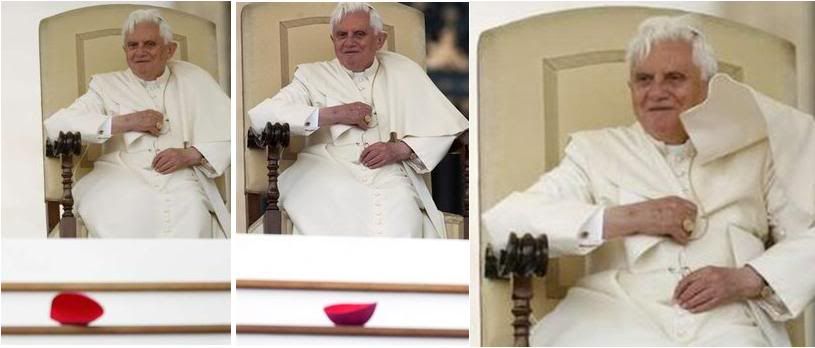 The Holy Father, who is often at the receiving end of 'wind effects', reacts with sympathetic amusement to a bishop's cap landing at his feet.
The Holy Father, who is often at the receiving end of 'wind effects', reacts with sympathetic amusement to a bishop's cap landing at his feet.
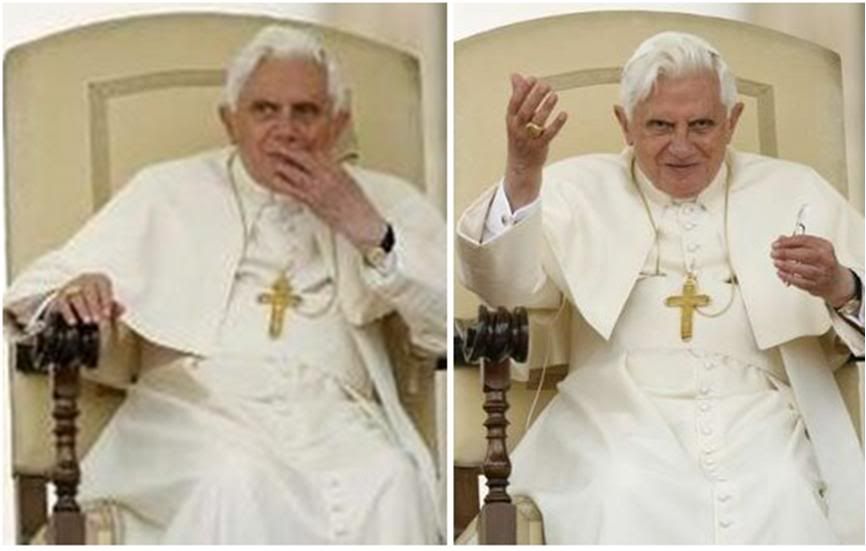
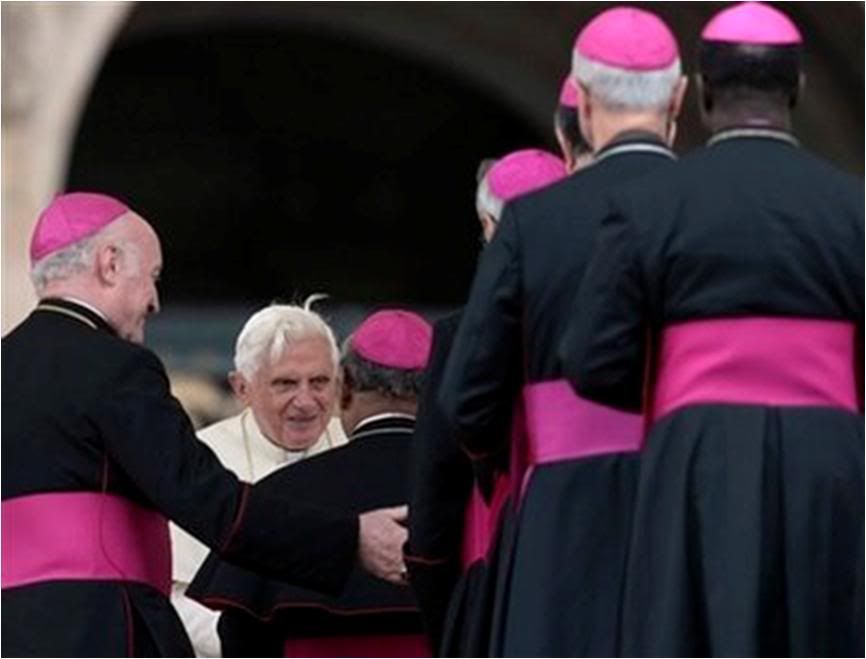
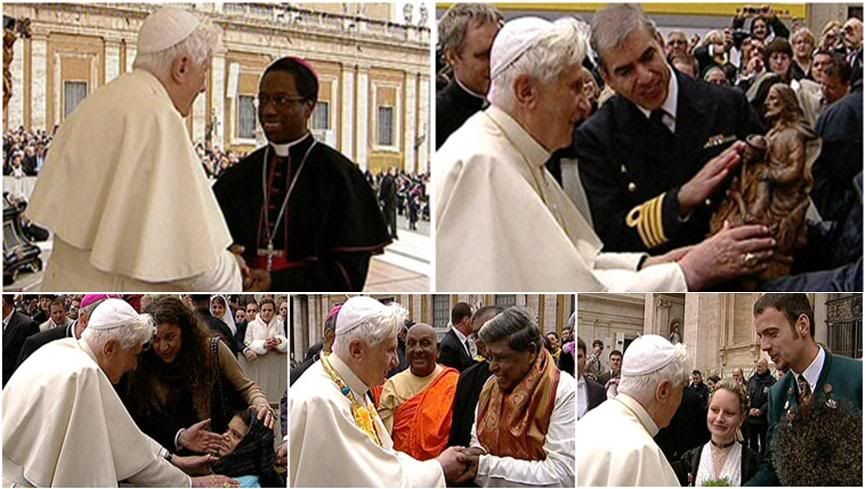 Sidelights at the GA today
Translated from
Sidelights at the GA today
Translated from
the 11/5/09 issue of

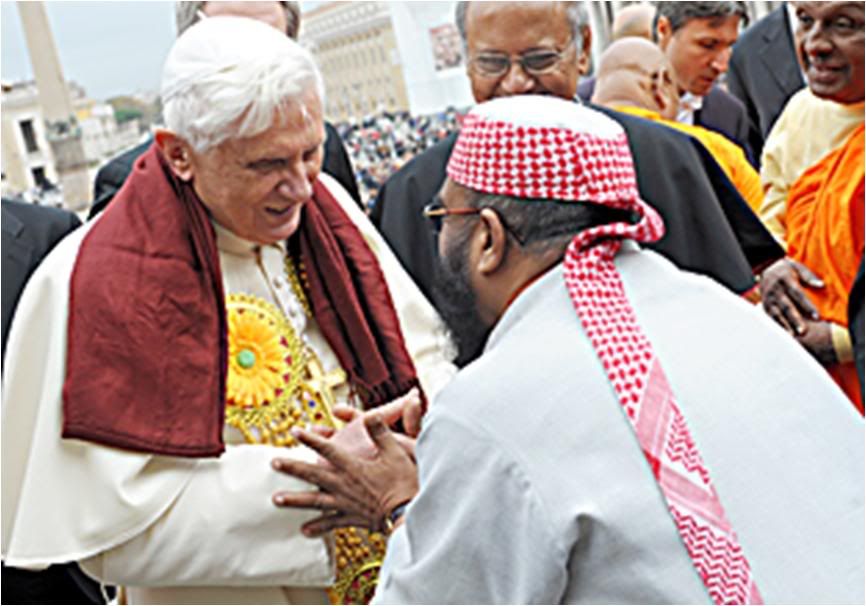
Leaders of various religions in Sri Lanka presented a joint statement expressing their desire for peace in their country to Pope Benedict XVI.
"With particular emphasis on the situation of refugees and necessary economic assistance" after more than three decades of civil war, according to Mons. Albert Malcolm Ranjith, Archbishop of Colombo, who is accompanying the delegation on a European tour to focus international attention on the plight of the victims of the long war.
The delegation met yesterday with Cardinal Tarcisio Bertone. Secretary of state. They are scheduled to visit European Union headquarters in Brussels, and the foreign ministries in Paris and London.
***
At the end of the General Audience today, a Nigerian girl recently liberated from the slavery of prostitution presented the Pope with stories of pain and hope of "the poor, the disabled, lonely and desperate persons" who together give life to the Comunità Giovanni XXIII.
Two years since the death of the community's founder, Don Oreste Benzi, "three thousand of us have come to testify that our work of charity is all done in the heart of the Church," said the group's leader, Giovanni Paolo Ramonda.
***
And it was to tell the Pope about their own work of charity "realized in justice and with scientific competence" that officials of the Oasi Federico came from Calabria, southern Italy.
They have set up a Benedict XVI Center to educate disabled young people to be productive, using innovative methods of instruction.
"We offered this pioneering center as a gift to the Pope and have invited him to visit us," said Matilde Leonardi, who heads the Center's scientific committee.
***
The ecumenical activity of the St. Clement Center in Kiev, capital of the Ukraine, was described to the Pope by its director Konstantin Sigoc and Fr. Filaret Egorov from the Moscow Patriarchate. They said the center "promotes a Christian cultural project that is tailored for the reality of a post-Communist nation".
***
The mayor of Bucharest, Romania, assured the Pope that his administration was working to preserve a Catholic cathedral that is threatened by the construction of a new skyscrapter.
***
Also present at today's audience were the mayor and parish priest of the Pope's birthplace, Marktl am Inn.
[Modificato da TERESA BENEDETTA 05/11/2009 17:56]